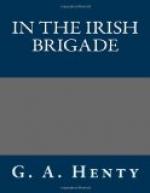“As a rule, they incline towards the party which seems likely to win. They would shout in Madrid as loudly for the Archduke Charles as for Philip. Catalonia and Valencia are the exceptions. There the balance of feeling is certainly in favour of the Austrian, but this is principally because they are afraid of Peterborough, whom they regard as almost supernatural, and fear he would take vengeance upon those who deserted his cause. But there is no accounting for them; cities have held out as stoutly for one candidate as for the other, without any apparent reason, so far as we can observe.
“We fight for Philip because he is Louis’s grandson, and it is important in the interest of France to stand closely allied with his party. But as for the Spaniards with us, I can tell you that we have but little trust in them.”
“But some of them are good, are they not?”
“We do not consider any of them of much account. But then the Spaniards on the other side are no better. They seem to have lost all their military virtues, ever since their best troops were demolished at Rocroi by Conde. That and the destruction of their fleet by the English, and the drain of their resources both in men and money, entailed by the long war in Holland, altogether deprived the people of their martial spirit. The war is to some extent between the English and us, because, of the allies England, Holland, and Austria, neither the Austrians nor the Dutch take any great share in the struggle. The Dutch are wholly engrossed with the defence of their fens, the Austrians are fully occupied in Italy and on the Rhine frontier, and it is only the English, who, fortunately, are not very numerous, who are against us, for the Portuguese can scarcely be counted in the business, being, if anything, slower and more stupid than the Spaniards themselves.
“However, at present the prospect is good. Peterborough has gone. Galway’s army has been almost destroyed; though, to do them justice, the English regiments fought magnificently, and if they had been seconded by the Portuguese the result might have been altogether different.”
“Then you found Spain much less rich than France?”
“There is no comparison,” Captain Fromart said. “It ought to be fully as rich, but the plains lie almost uncultivated. The people seem wholly without energy, and the ruling class are always intriguing, and seem to pay little attention to their estates. You see but few castles and chateaux, such as are dotted over France. I do not say that, at the present moment, France can be considered a prosperous country in material matters. The expenses of the wars have been enormous, to say nothing of the Court. The people are ground down by taxation, and the misery in some parts of the country is extreme; but left to themselves the people will work, and work hard. Our soil will grow anything, and after twenty years of peace, France would altogether recover herself.”




